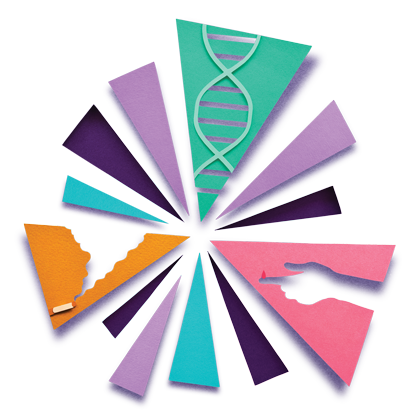New AI Tool Brings Hope in Quest for Earlier Detection

Whether it’s OpenAI’s ChatGPT or Google’s Bard AI, 2023 is the year that artificial intelligence has dominated the virtual water cooler.
In medicine, AI is already assisting in myriad ways. To name a few, AI can enhance diagnostics through analysis of big data and aid radiologists in interpreting images. It’s even helping to personalize medical treatment and in the diagnosis of disease.
Pancreatic Cancer Screening Status
Screening for common cancers like breast, cervix, and prostate cancer relies on relatively simple and highly effective techniques, such as mammograms, Pap smears, and blood tests. These methods have revolutionized outcomes for those cancers by enabling early detection and intervention during the most treatable stages.
For pancreatic cancer, the picture is very different because there is no easy screening test. The disease is very often diagnosed in later stages, due to the location of the pancreas deep in the abdomen and the often-vague early symptoms. The late diagnosis contributes significantly to the low survival rate for pancreatic cancer.
People at high risk for developing pancreatic cancer—those with certain genetic mutations, a family history of the disease, or an identified pancreatic cyst—are urged to undergo regular screening. But pancreatic cancer screening is more challenging than a mammogram. It generally involves blood tests, endoscopic ultrasounds and MRIs given at specific intervals. Although research shows high-risk screening is beneficial to patients, it can be difficult to access if patients live far from academic medical centers, where most of the research takes place. It can also be costly.
Most pancreatic cancers occur randomly, and the disease is rare compared to such cancers as breast or prostate, so mass screening of asymptomatic patients for pancreatic cancer is not recommended at this time.
Predicting Pancreatic Cancer Three Years Before Diagnosis
Research published in May 2023 in Nature Medicine suggests that AI screening of large groups of patients beginning with their medical records could make earlier diagnosis of pancreatic cancer possible. That, in turn, could lead to earlier and more effective treatment of the disease.
“It’s a remarkable study and we’re all very excited about it,” says study co-author Michael H. Rosenthal, M.D., Ph.D., Assistant Director of Radiology, Pancreas and Biliary Tumor Center of Dana-Farber Brigham Cancer Center (Boston, Massachusetts). “This is a great example of the cool and wonderful things that AI can do. Finding the subtle sense of cancer among diagnostic codes around the world really gave us the sense that we are on the right track.”
In the analysis, an AI tool successfully pinpointed people at elevated risk for pancreatic cancer by looking back at their medical records, finding evidence of heightened risk up to three years before they were diagnosed.
Researchers used data from the medical records of patients in both the United States and Denmark dating from 1977 to 2020. They looked at a group of 6.2 million Danish patients, 23,985 of whom were eventually diagnosed with pancreatic cancer, and 3 million American military veterans receiving care through the Department of Veterans Affairs, of whom 3,864 were ultimately diagnosed with the disease.
The researchers used a machine-learning model to analyze the data, teaching it to predict cancer risk based on symptoms and the various diagnosis codes contained in patients’ medical records. These various diagnostic codes included some symptoms not generally associated with pancreatic cancer. That, Rosenthal points out, is very important. “We added in common problems like gallstones, anemia, type 2 diabetes, vomiting, and stomach pain,” he says. “Those are common complaints and sometimes that’s all they are. But in the model, these symptoms helped in prediction of pancreatic cancer. And that prediction could be up to three years before actual diagnosis.”
The researchers say if this tool were in practice today, about 7 percent of the people the AI model identified as being in the 0.1 percent highest risk group would go on to develop pancreatic cancer within one year. By targeting surveillance to high-risk patients, the tool could make screening more affordable, they write.
Teaching a Machine to Learn
Machine learning is a complicated type of AI. In simplest terms, the researchers trained or “asked” the AI tool to look for well-known and subtle signs based on the data contained in the health records. Based on the various combinations of disease codes for each patient, as well as their time sequence, the tool learned how to predict which patients were most likely to develop pancreatic cancer at some point in the future. “Every time you go to the doctor there is a wealth of information collected about you the patient,” Rosenthal notes. “Sometimes it is glaringly obvious as to what a patient should do and look out for if that patient has high blood pressure and a family history of heart disease. But it’s difficult to put all different types of seemingly disparate information together to see commonalities or what potentially might happen in the future.” For example, he says, “a lot of the symptoms we used and their related diagnostic codes were not directly related to pancreatic cancer. And some didn’t even originate from the pancreas.”
The researchers tested different versions of the AI models at six months, one year, two years, and three years. Each version of the AI tool was significantly more accurate at predicting who would develop pancreatic cancer than current population-wide estimates of disease incidence, the researchers say. The researchers also say the AI tool is at least as accurate in predicting pancreatic cancer occurrence as current genetic sequencing tests, which are limited to a small subset of patients. “These are still early days and we need to do more studies,” Rosenthal adds. “But if the data keeps moving in this direction it is possible that screening and earlier detection could happen in pancreatic cancer. That would be an incredible win for our patients.”
The research was led by investigators at Harvard Medical School and the University of Copenhagen, in collaboration with VA Boston Healthcare System, Dana-Farber Cancer Institute, and the Harvard T.H. Chan School of Public Health. This work was sponsored by Stand Up To Cancer and the Lustgarten Foundation.






